| |
|

MONDAY, JUNE 30

Friday, July 11 Congregation Beth El Kabbalat Shabbat Services


FRIDAY, JULY 18 Temple Solel Shabbat at Beach


MON., SEPT. 29-THURS., OCT. 9


WAR AND LORE
Sarkozy should butt out of Israel's affairs
By Isaac Yetiv, PhD
 LA JOLLA, California—Monsieur Sarkozy, mêlez-vous de vos oignons! (Take care of your onions). LA JOLLA, California—Monsieur Sarkozy, mêlez-vous de vos oignons! (Take care of your onions).
At a meeting of the Knesset last week, the French President, after pledging that "France will always be Israel's friend," engaged in a stunning diatribe against Israel's behavior toward the Palestinians under the guise of friendly advice: Jerusalem,he said, should be divided and the Arab part should become the capital of the new Palestinian state; all the Jews living in the West Bank must be expelled; "no peace can be achieved if the refugee problem is not solved;" freedom of the holy sites etc. Sarkozy recited the Arab propaganda list of demands to Israel, nothing to the Palestinians or the Arab countries, as usual, and some more.
By doing so, he has violated a cardinal rule of international diplomacy, non-ingerence dans les affaires interieures d’un autre etat souverain (no interfering in the internal affairs of another sovereign state). He has also weakened Israel's position, endorsed the Arab rejectionism of peace, emboldened the terrorists by rewarding their behavior, and aided and abetted the enemies of Israel. This is called chutzpah, which can only be the work of a false friend; Chirac, not known for his sympathies for Israel, would never have displayed such hypocritical behavior. Dieu me garde de mes amis! (May God
protect me from my friends). Because, with friends like that, who needs enemies?
Sarkozy's offer to "help" defray the costs of deporting the West Bank Jews is very offensive to Jewish ears. It demonstrates his lack of sensitivity as a Frenchman who should remember how his country, under the Vichy collaborationist government with the Nazis, enthusiastically "helped" deport its own Jewish citizens to their death.
Why is he doing this? Maybe he learned the lesson from De Gaulle who said that, in international relations, there are no friends or allies, there are only interests. And he sees his country's interest today in appeasing his turbulent and unassimilable six million Arabs living in France by throwing at them an Israeli bone. And he wasn't wrong: the next day the Arab media praised him for his courage in telling the "truth" to "the Zionist entity and its oppressive regime." He also has a personal agenda, a need to redorer ses blazons (re-gild his faded medals) with the Left, which is anti-Israel, and with the same proletariat of North-African Arabs, who are vegetating in the suburb slums and ready to explode at any moment, whom he had insulted and called canaille (low-life bums) when he was only a minister in Chirac's government after they rioted with extreme violence.
Sarkozy didn't advise President Bush or the US Congress on how to resolve the Iraqi mess or what concessions to make to terrorists. He didn't advise any Arab country , or even the Palestinian Authority on what concessions to make for the sake of peace. It is revolting to see how Israel has become the currency with which to placate and appease the murderers who do not hide their malevolent designs to destroy it.
What makes the French president so insensitive to believe that his intempestive and callous interference is fair game in the Israeli parliament, and what is the source of his chutzpah? It is clear that he drew courage from the behavior and the latest acts of appeasement by the Israeli government itself. It is common knowledge that if one wants to be respected, one must first respect himself. The Olmert government was elected on a platform that pledges a unilateral withdrawal from the West Bank, based on the models of South Lebanon and Gaza which proved to be disastrous. It has now accepted a treacherous cease-fire (no, a hudna or even less, a tahdieh, some kind of temporary truce that Hamas, or its acolytes ,brothers in terror, can violate at will, and they have done so at this writing).
Olmert's government has begged the Lebanese to open "peace discussions , even on the Shaaba farms" after the blunder of the Hizballah war and the total submission of Lebanese government to Hizballah demands. Lebanon humiliatingly rejected these advances.
And the Israeli government is begging the Syrians , via Turkish mediation, to deign accept the Golan, thus inviting another rejection. No wonder then why Sarkozy, or Condoleezza Rice, or the EU, or the UN do not show respect to the Israeli government.
Notwithstanding the lack of self-respect displayed by the Olmert government, the French president has no business telling Israel what to do. With the French notorious history of anti-Semitism, Sarkozy is malvenu (not fitting) to demand that the West Bank become Judenrein (clean of Jews), a painful reminiscence of Nazi era. By what perversion of logic and historic integrity can he explain why 1.2 million Arabs can live in Israel in freedom and prosperity and no Jews shall live in Judea and Samaria?
We don't even need to remind him that these territories have been conquered in defensive wars, and where in history have the conquerers, even in wars of aggression, returned those lands and expelled their own citizens? Will the French president return Alsace-Lorraine to Germany? Or Savoy and Nice to Italy? or Artois and Roussillon and Franche-Comte and Bourgogne etc. ?


REFLECTIONS
Midbar kvetching: complaints in the desert
By Sheila Orysiek
 SAN DIEGO—At a Torah Study session conducted by Dr. Reuven Firestone, during a Scholar-in-Residence weekend at Temple Emanu-El, I asked him if the Hebrew tribes had an awareness of the three basic concepts of G-D: omniscient, omnipotent, omni-present (the Three O’s). Dr. Firestone replied that they were not originally part of the Jewish concept of G-D. He said this view of G-D arose in Greek philosophy and was later applied to Jewish monotheism. This explains a lot about what happened in the desert. SAN DIEGO—At a Torah Study session conducted by Dr. Reuven Firestone, during a Scholar-in-Residence weekend at Temple Emanu-El, I asked him if the Hebrew tribes had an awareness of the three basic concepts of G-D: omniscient, omnipotent, omni-present (the Three O’s). Dr. Firestone replied that they were not originally part of the Jewish concept of G-D. He said this view of G-D arose in Greek philosophy and was later applied to Jewish monotheism. This explains a lot about what happened in the desert.
 The tribes had experienced and survived the plagues, the miraculous crossing of the sea, and found themselves free - but in a desert - a desert with which they were not familiar going to a land they had never seen. The promise of this land only lived in their folk memory from hundreds of years before. People attending Torah Study often express amazement how the newly rescued Israelites could complain, doubt G-D’s promise, doubt G-D’s ability to deliver on the promise, question Moses and generally see the glass as half (or more) empty. The tribes had experienced and survived the plagues, the miraculous crossing of the sea, and found themselves free - but in a desert - a desert with which they were not familiar going to a land they had never seen. The promise of this land only lived in their folk memory from hundreds of years before. People attending Torah Study often express amazement how the newly rescued Israelites could complain, doubt G-D’s promise, doubt G-D’s ability to deliver on the promise, question Moses and generally see the glass as half (or more) empty.
But of what did they complain? They were frightened because there was no water. This is a legitimate complaint and even more so if one has no concept of the Three O’s and therefore a belief that G-D would have no difficulty providing water. With little time to rejoice in newly found freedom they found themselves in a barren wilderness, with their elderly, their children, pregnant women - under the care of a Deity whom apparently they had not heard from in approximately 400 years. Who wouldn’t be skeptical? Could they afford not to be skeptical?
Then there was the complaint about no meat. A lack of protein is a legitimate complaint. Being in a desert, one would assume there wasn’t too much vegetation either. G-D provided manna which did sustain life but they had no way of knowing that it would. (And forty years of manna, is a rather narrow menu selection.) After complaining, the pheasants did fly in but there was no guarantee of a continued flight schedule. And forty years of manna and pheasant - under glass - au vin - or fricasseed - is still a tad eye glazing.
The insistent request of the people and Moses that G-D travel with them to the Promised Land seems to us a “given” - but it was not to them. They didn’t know the end of the story. Up until that point they had only experienced G-D in Egypt and at Sinai - how could they know that a Deity they couldn’t see (except for the column of cloud and fire) was capable of traveling with them and making good on His promises?
They were being asked to exchange - or put at risk - the three basic necessities of life - food, water, shelter/safety - which apparently they did have in Egypt (or they wouldn’t have multiplied so fruitfully) for a concept - an idea - a new set of rules - a different way of life. All to take place in a land far away filled with people ready to defend that land. Exchanging concrete necessity for an intangible is a huge gamble.
And who were they being asked to put at risk? They were being asked to risk life and limb - not only of the strong and stalwart - but their children. If the Three O’s were not part of their conceptual vocabulary, not part of their understanding, one can perhaps sympathize with their constant questioning of G-D. Their lives were at stake.
The scouts that Moses sent out - ten of whom said that the Promised Land was inhabited by giants and thereby sowed fear in the ranks - misreported out of fear. They had been slaves, not warriors. They were expected to attack fortified towns sheltered behind walls, manned by armed and experienced soldiers. This is a legitimate concern. While G-D promised them victory as a whole, each man was concerned with his personal survival and that of his family - his own individual universe and that was not guaranteed.
Because of this “glass half empty” and the people’s embrace of it, they were condemned to wander for forty years and, except for Caleb and Joshua and the younger population, would ultimately not enter the Promised Land. In all probability not everyone got to vote for or against believing the scout report; women most likely had little say, and yet everyone got punished. It’s a bissel shvar (a little difficult) to know that after all that tsuris (trouble) in getting out of Egypt one will have to wander fardreit (in circles) in a desert - and never see the Promised Land through no fault of one’s own. Imagine if you were told that through no fault of your own, after wandering around a bleak landscape for forty years, you aren’t going anywhere. Could make a person a little cranky.
When we plan a trip to the desert - we give the car a good checkup, kick the tires, fill the gas tank, check the air conditioning, tell people where we are going and when we will be back, take bottles of water, a cooler with food, extras of everything for the children, a map, cell phone, activate the GPS system, often belong to some kind of road assistance program, take extra jackets, sunscreen, lip balm, hand cream, shade hat, good shoes, sun glasses and every other thing we can think of - and make sure the medical insurance is paid up. They had none of this and had no concept of the long term power of G-D; some plagues and a sea miracle notwithstanding. A miracle or two are one thing, the Three O’s, quite another.
We wonder why they kept harking back to their days as slaves - wasn’t being free good enough for them? But free to do what? Free still needs to eat, drink and be safe and warm. Prisoners often have difficulty adjusting to the open door. The idea is wonderful - but the reality of having suddenly to make decisions and choices, is daunting. Some released prisoners commit a crime so they can once again return to the world in which they feel secure. Black Americans after the Emancipation Proclamation also responded to freedom with varying degrees of behavior. Quite a number of them chose to stay where they were; better the devil they knew. The world around them was not a welcoming one.
Those of us who know about and believe in the Three O’s, take for granted that of course G-D could deal with any enemies, level any walls, produce water, pheasants, fulfill promises. But the tribes of Israel didn’t know that, they had no concept of the Three O’s to strengthen them, and they didn’t know the end of that story. While we do know the end of that story, we don’t know the end of the rest of the story. For those who believe, we are strengthened by our trust in the Three O’s - formulated by the Greeks.
And still we kvetch - about a lot less.
By Cynthia Citron
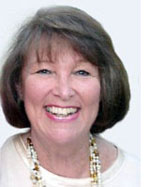 SANTA MONICA, California—In theater, as in baseball or any other group endeavor, a team is only as good as its weakest link. And if your team is full of weak links, you’re in trouble. SANTA MONICA, California—In theater, as in baseball or any other group endeavor, a team is only as good as its weakest link. And if your team is full of weak links, you’re in trouble.
Unfortunately, this is the case with the eerily beautiful musical, Cabaret, now running at the Morgan-Wixson Theatre in Santa Monica.
Santa Monica is known to have a plethora of talented actors and singers living close by its many fine theaters. Apparently they were all engaged elsewhere, however, when this production was being cast. One has only to wince through Hannah Campbell’s completely off-key rendition of the title song and her raucous and shrill “Mein Herr” to recognize that this is not “Cabaret”’s finest hour (or finest two-and-a-half hours, to be precise).
To give credit where it’s due, however, (and bleak as that prospect is), Ron Gloff, who has a reasonably good voice, does a nice job as Clifford Bradshaw, the identity chosen by author Christopher Isherwood for his autobiographical alter ego. (Bradshaw was actually one of Isherwood’s middle names.) Gloff is understated and credible, and he doesn’t end all his songs with a harsh and grating bellow, as most of the other singers do.
Also good, in a soft, understated way, is Joanna Churgin, as the landlady, Fraulein Schneider, who sings her numbers in a sweet, earnest voice. Most especially her solo, “So What?” whose clever lyrics are an anthem to staying calm in the face of trivial woes.
Kashena Sampson as Fraulein Kost, the sailor-loving lady who does “business” in Fraulein Schneider’s house, has a fine strong voice which she puts to good use outsinging the rest of the company. There ought to be more of her.
Cabaret began life as Christopher Isherwood’s “Berlin Stories,” chronicling the years between 1929 and 1933 when he lived in Berlin, teaching English, writing, and participating in the wildly erotic atmosphere of the Weimar Republic in the pre-Nazi years. But he was not entirely oblivious to the changing political atmosphere: as he wrote in “Goodbye to Berlin” in 1939, “The audience took the fights dead seriously… The potential moral is certainly depressing: these people could be made to believe in anybody and anything.”
“Goodbye to Berlin” was one of his Berlin stories. It began, “I am a camera with its shutter open, quite passive, recording, not thinking.” In 1951, twelve years after Isherwood’s novel was published, English playwright John Van Druten prepared it as a play called I Am A Camera, from which the Kander and Ebb musical Cabaret evolved.
The play and the musical center around Sally Bowles, the English chanteuse who heads the bawdy crew at the Kit Kat Club, and with whom the American writer, Bradshaw, falls in love. (This, however, is not autobiographical, since Isherwood’s lovers were all young men.) Hannah Campbell, who plays Sally, is a tall young woman in a blonde wig who does an adequate job of acting, despite her dreadful singing voice. And she is certainly more agile than the rest of the girls at the Club, who are a chunky, clunky lot at best.
The Most Important Role in “Cabaret”, however, is that of the Emcee of the Kit Kat Club (better known as “the Joel Grey role”), who personifies the decadence of the time and presages the political upheaval to come. In this role Aric Martin is suitably vulgar and slimy, with his rouged cheeks and ambivalent sexuality, his flamboyant androgynous costumes, and his virulent hostility---most especially in “The Money Song” and his solo “If You Could See Her” in which he insists that his ape girlfriend “doesn’t look Jewish at all!” Martin, who appears fairly androgynous himself, with his thin, hipless torso and pouty lips, is gracefully sinister as he weaves his way through the dancers and the tight, spasmodic movements designed by choreographer and director Jason Coosner.
Anne Gesling, who is the producer and musical director, also served as costume designer, and in that capacity has designed some appropriately tacky costumes for the Kit Kat Club girls, some slinky and silky 1930s costumes for Sally (including a gorgeous black dress with a handkerchief hemline that would be exquisitely fashionable today), and wide-lapelled suits for the men. My only question is, Whose pants was Ernst Ludwig (JP Sarro) wearing? They were bizarre: balloony and saggy and looked like the seams had been sewn askew; they certainly didn’t fit properly. Further, the Nazi armbands worn by Herr Ludwig and the Nazi Youth singers (who did a powerful job on the chilling “Tomorrow Belongs to Me”) would have been more effective and affecting if they had been real. Drawing the swastikas on the armbands with a black marking pen just didn’t do it for me.
The set, designed by Thomas A. Brown, consists mostly of bare stage with risers at varying heights for the dancers to pose on, and with two tiny amendments tucked along the side. Upstage right is Clifford Bradshaw’s room (and, with a slight change of furniture, the engagement party room); upstage left is a small area that alternates as a train car and Fraulein Schneider’s sitting room. These setups are fine, but the blackouts between scenes, when some of the props are moved around or the performers alter their costumes, are much too long and divert attention from the ongoing action.
Surprisingly, neither Kander nor Ebb are credited in the Cabaret program for writing the delicious songs, nor is Joe Masteroff, who wrote the book. (They are mentioned on the promotional postcard for the show, though, if you happen to pick one up). But it was a delight to hear all the familiar songs again. After all, who wouldn’t bounce and grin through the saucy “Wilkommen,” “Two Ladies,” and the show-stopping “Cabaret”? You certainly would---if you could conjure up the memory of Liza Minnelli and Joel Grey.
Cabaret will continue Fridays and Saturdays at 8 and Sundays at 2 through August 3rd at the Morgan-Wixson Theatre, 2627 Pico Blvd., in Santa Monica. For tickets, call the box office at (310) 828-7519.



THE JEWISH CITIZEN
Dancing their way through the senior years
By Donald H. Harrison
 OCEANSIDE, California—There have been times after visiting with us for a few days down in San Diego, my father-in-law Sam Zeiden appeared to be chomping at the bit to get back to his home in the Ocean Hills Country Estates. OCEANSIDE, California—There have been times after visiting with us for a few days down in San Diego, my father-in-law Sam Zeiden appeared to be chomping at the bit to get back to his home in the Ocean Hills Country Estates.
“What’s your hurry?” Nancy and I would ask. And he’d say, “I’ve got lots of things to do.” What, I wondered, could be so pressing for a man who at age 89 has been long retired? What deadlines does he have to meet? What client meetings does he have to prepare for? What could be the real reason for his hurry to get back to the land of senior citizens, where there are more than 1,600 roomy Mediterranean-style homes on streets named for Greek islands?
The other night we found out. He just doesn't want to miss out on any of the fun.
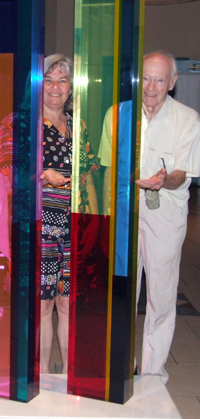 Nancy, her father (together at right), and I went to the clubhouse of the Ocean Hills Country Club, where we attended the first evening of a sold-out, two-night presentation of “Dancing with the Village Stars,” a revue in which The Village Tappers, Theatre Dance, Jazz and Belly Dance classes all strutted their stuff. Nancy, her father (together at right), and I went to the clubhouse of the Ocean Hills Country Club, where we attended the first evening of a sold-out, two-night presentation of “Dancing with the Village Stars,” a revue in which The Village Tappers, Theatre Dance, Jazz and Belly Dance classes all strutted their stuff.
The references to “Village” in one group’s name and in the title of the show indicated that such activities have been around since before the sprawling senior citizens complex once known as Leisure Village changed its name to the Ocean Hills Country Club.
We were seated at a table for 12, where on each table there were three bottles of Two-Buck Chuck wine —as the inexpensive but surprisingly good Charles Shaw wines are nicknamed— along with a mixture of nuts and pretzels. All told, the refreshments couldn’t have cost more than $10 per table (if that) and with a dozen persons per table having paid $10 each, that meant each filled table represented $110 to defray production costs, and possibly even to help turn a profit.
There were two dozen numbers danced, mostly to tape-recorded music, so there was little or no expense for the accompaniment. But, oh, the costumes were elaborate and it seemed as if each of the 30 dancers had anywhere from three to six costume changes. Ruth Leader, one of the dancers, said the performers purchase their costumes. She had six in this production, costing her with accessories about $500 total. It's an expense, but "we feel that we are providing a service to the community," Leader told me.
 Nancy and I may conceptualize the residents of Ocean Hills Country Club as aging, but it was clear that on nights like this, at least, they don’t shackle themselves with such labels. As the audience gathered, there was as much anticipation and excitement in the air as there is at any stage production at a high school or a college, and if there were a technical flaw in the dancing here and there—well, no one really cared. When you’re in your senior years and you’re hoofing around the stage in imitation of the way they used to do on Broadway and in the movies, there’s a great sense of accomplishment in that. And if others are taken by surprise at the sight of old men and women in youthful costumes prancing around the stage, such as this scene above from the number "You Must Have Been a Beautiful Baby," let me challenge them: ‘Do you think you’d be able to do so well at their age?” Nancy and I may conceptualize the residents of Ocean Hills Country Club as aging, but it was clear that on nights like this, at least, they don’t shackle themselves with such labels. As the audience gathered, there was as much anticipation and excitement in the air as there is at any stage production at a high school or a college, and if there were a technical flaw in the dancing here and there—well, no one really cared. When you’re in your senior years and you’re hoofing around the stage in imitation of the way they used to do on Broadway and in the movies, there’s a great sense of accomplishment in that. And if others are taken by surprise at the sight of old men and women in youthful costumes prancing around the stage, such as this scene above from the number "You Must Have Been a Beautiful Baby," let me challenge them: ‘Do you think you’d be able to do so well at their age?”
This was entertainment fare for people of every background, but given that San Diego Jewish World is a Jewish publication, let me first cover those angles that had a Jewish flavor. To begin with, the production was staged in Abravanel Hall, named for the Greek-born, late Sephardic conductor of the Utah Symphony, Maurice Abravanel.
 
SHOW TUNES—Charlotte and Jack Pivo dance to "You Are Woman, I Am Man" from Funny Girl
and cast mmembers of "Dancing With the Village Stars" become the "Jets" from West Side Story
One of the charming dance sequences was to the music of “You Are Woman, I Am Man,” from the very Jewish musical Funny Girl, based on the life of Fanny Brice. In the movie, this seduction scene starred Barbra Streisand and Omar Sharif; at Ocean Hills Country Club, it was performed by Charlotte Pivo and Jack Pivo, and the couple’s obvious affinity for each other made the scene charming.
Perhaps to give Arabs equal time, there followed a belly dancing sequence to “Midnight at the Oasis,” featuring synchronized gyrations by Lillian Ashton, Ginny O’Hara, Valerie Davis, Valerie Farra, Maura Hill, Ruth Leader, Sharon Lair, Mary Jane Matthews, Mona Miller, Darlene Piercy and Barbara Vilclauskas. There was also a sultan in the sequence—and guess what his name was—George Mozes!
Leonard Bernstein’s West Side Story accounted for four quick dance sequences, with the first “Jets,” really quite enjoyable, as the dancers got into their finger-snapping, swaggering characterizations of street gang members. Some of the women performers danced as men for this particular sequence. The Jet gang included Lyle Bergeson, Renée Klepesch, Sharon Lair, Clarice Magnusen, George Morgan, Gene Thompson, Valerie Thompson, both Pivos and Mozes.
 
Although Cabaret is a story about life in Germany’s Weimar Republic as the Nazi storm gathered, its association with the events leading to the Shoah make it part of the Jewish consciousness. (See Cynthia Citron's review above). In the Ocean Hills Country Club production number, Klepesch, Leader, Charlotte Pivo and Vilclauskas were joined by Clarice Magnuson, Dorothy Miller and Darlene Piercy.
In a number called “The Bum’s Crush,” Lyle Bergeson portrayed a hapless hobo who wanted to dance with at least one of the girls who passed by his park bench, but none would have anything to do with him. Then he found a doll, and danced with it, until a mother and a little girl (Joanne Harms, Jennifer Oakley) happened by, snatched away the doll, and then smacked him over the head with it. This was definitely a crowd favorite, with passersby in the little drama played by O’Hara, Jack Pivo, Rona Cole, Charline Kenney, Jackie Stanislawski, and George Morgan. They even got curtain puller Seymour Prell to put on his dancing shoes for this number.
Another favorite was Joe Ronnell portraying Maurice Chevalier in “Thank Heaven for Little Girls,” an act that brought onto the stage a number of the performers’ grandchildren, all of them looking adorable, of course. The cast for this number included Sophia Cole, Faith Muehlbacher, Kate Wygal, Jennifer Oakley, Cara Grace Wilkerson and Mariah Wilkerson.
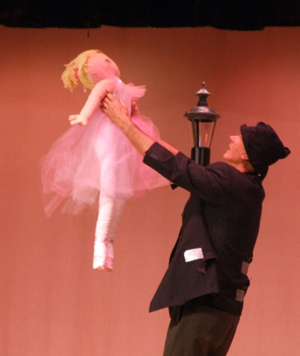 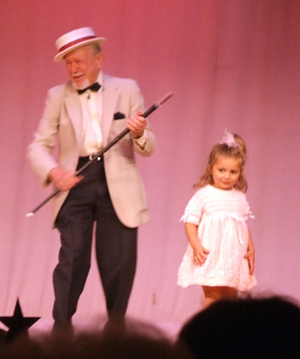
One of the more unusual numbers was “I Love a Piano,” in which the keys of the piano were part of the dancers’ costumes. As Klepesch signaled to the various dancers, they did their stes to the accompaniment of the taped piano music In that Klepesch is the president of the Ocean Hills Country Club’s Homeowner’s Association, no one had any trouble at all picturing her as the authoritative conductor.
I wished that there had been a narrator who could have woven a little story through these various dance sequences, even if that meant cutting a few of the numbers. But that was a quibble really—most people in the audience seemed perfectly content to see how well the beautifully costumed performers would do facing the music.
And judging by the buzz in the lobby afterwards, everyone felt the performers had acquitted themselves quite well.
What are these seniors be thinking? Maybe something like, “hang around the children’s houses, and miss an evening like this? Not a chance!”

.


WHAT'S GOOD TO EAT IN SAN DIEGO
Menus come on parchment in Dussini Mediterranean Bistro in the Gaslamp
By Lynne Thrope
 SAN DIEGO—Another fabulous Restaurant Week is unfortunately over. Those who know me know it’s my favorite event in San Diego because I and so many other local and visiting foodies can enjoy a 3-course prix fixed dinner for $30 or $40 in any one of the 130 participating restaurants ! A new one that I patronized, Dussini Mediterranean Bistro, located in the Gaslamp Quarter’s Old Spaghetti Factory building at 5th and K, is worth paying full fare for until 2009 Restaurant Week comes around again. It was an extraordinary experience from start to finish, which, for me, lasted for four irresistible hours. SAN DIEGO—Another fabulous Restaurant Week is unfortunately over. Those who know me know it’s my favorite event in San Diego because I and so many other local and visiting foodies can enjoy a 3-course prix fixed dinner for $30 or $40 in any one of the 130 participating restaurants ! A new one that I patronized, Dussini Mediterranean Bistro, located in the Gaslamp Quarter’s Old Spaghetti Factory building at 5th and K, is worth paying full fare for until 2009 Restaurant Week comes around again. It was an extraordinary experience from start to finish, which, for me, lasted for four irresistible hours.
Each of the nine Restaurant Week menu items, elegantly scripted on parchment, sounded scrumptious, so my companion and I decided to sample different items. The portions were liberal and the service lavish. Our server, Jessica, provided all the appropriate necessities for splitting and made us ask for nothing. She uncannily anticipated and took care of our every need with a smile and some friendly conversation. Also incredibly accommodating is Carrie Richards, the general manager. She’s the one to call at (619) 233.4323 to arrange a life cycle event celebration.
After enjoying the complimentary condiments consisting of humus, sweet butter, and olive tapenade, dinner opened with the Grilled Bread Salad ($14) heaped with squares of artisan bread soaked in a tangy vinaigrette and tossed with prime New York strip, tomatoes and basil. It is a most inventive creation that distinguishes Dussini from all the other Gaslamp eateries and one that I will repeat - as a main dish.
The other starter we selected was the Brie & Asparagus Tart ($10) with a side of frisee salad. Both of these dishes were so impressive that I added them to my list of possibilities perfect for my Yom Kippur breaking of the fast. Entrees followed with the Grilled Salmon ($26) swimming in an apricot, ginger, and arugula sauce and the Risotto du Jour, which I won’t describe, because it changes daily. Even though our tummies were more than satisfied, we somehow managed to indulge dessert, which was a hazelnut meringue beautifully presented with a fresh fruit tart and a chocolate lava cake which is listed on the regular menu as Chocolate Delice ($9). My companion and I could not get enough of the saffron ice cream and red wine syrup topped off with mousse and flourless cake.
Our amusement continued to the third floor for some fun playing billiards and a sampling of a smoother than smooth Don Julio 1942 tequila and the always incredible Licor Cuarenta y Tres of Spain. Taste them fireside in the corner of the capacious space after a Padres game. Before the game, try one of the Dussini Dogs ($6) or Dussini Sliders ($6). Get 50% off during Hospitality Hour 4:00p-6:30p Monday – Friday and Sundays all day….B’Tayavon!
Dussini Mediterranean Bistro, 275 Fifth Avenue, Gaslamp Quarter, (619) 233.4323. Dining Room Hours: Sunday-Thursday 5:00p - 10:00p; Saturday & Sunday 5:00p – 11:00p; Fireside Loft Bar Hours: Sunday – Thursday 4:00p – 12:00a Friday & Saturday 4:00p – 1:00a Valet Parking Available

Remember your loved ones on-line
Would you like to honor a friend's or relative's special simcha such as a birthday, wedding, anniversary, election or special award? Or would you like to memorialize a loved one? Now you can become a sponsor of one day’s edition of “Adventures in San Diego Jewish History” (see today's edition below) by sending a check for $18 to the Harrison Enterprises, publishers of San Diego Jewish World, P.O. Box 19363, San Diego, CA 92159.
Please indicate what date you would like to reserve, and the occasion that you wish to honor or memorialize, and be sure to include your phone number in case we have questions. In the event that more than one person seeks a particular date, we will run all such submissions at the same time. The editor encourages items of interest to the Jewish community, and reserves the right to reject any that might be deemed inappropriate.
These memorializations and honors will be archived along with the rest of "The Adventures in San Diego Jewish History," providing your family and friends with an internet searchable reference.
A separate opportunity to memorialize a loved one is through the Louis Rose Society for the Preservation of Jewish History, the archives of which are posted on this website as a service. For $36, each member of the Louis Rose Society is entitled to memorialize or honor one member of the San Diego Jewish Community. Additional honorees may be honored for $18 per person. Tax-deductible checks for the Louis Rose Society's program may be mailed to the Jewish Community Foundation/ Louis Rose Fund, 4950 Murphy Canyon Road, San Diego, CA 92123.
Please consider honoring someone by sponsoring a daily history edition and by joining the Louis Rose Society. If you have questions about either, please call Don Harrison, San Diego Jewish World editor, at (619) 265-0808, or contact him at editor@sandiegojewishworld.com.
|

ADVENTURES IN SAN DIEGO JEWISH HISTORY
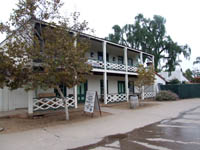
Robinson-Rose House
|

Old Temple Beth Israel |
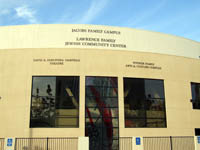
Lawrence Family JCC |
Editor's Note: We are reprinting news articles that appeared in back issues of various San Diego Jewish newspapers. You may access an index of the headlines of those articles by clicking here. You may also use the Google search program on our home page or on the headline index page to search for keywords or names.
U.J.F. Announces Close of Campaign
From Southwestern Jewish Press, Thursday, June 12, 1947, page 1
Voting to close the 1947 United Jewish fund Campaign on June 30, the Board of directors of the United Jewish Fund expressed their thanks and appreciation to all of the workers and contributors. Eli h. Levenson, President of the Fund, declared, “When we look at the history of giving in San Diego and realize that the Jewish Community this year gave 60 percent more than it did in 1946, we can feel that we have accomplished a step forward in building a sound Jewish community.”
Louis Steinman and Max Rabinwtiz, chairmen of the campaign, announced that on the basis of money still outstanding, the 1947 campaign would bring to the United Jewish Fund before the end of the year a total of $225,000. They urged every person who has not as yet made his contribution to the Fund to do so now.
“The Joint Distribution Committee, part of the United Jewish Appeal, is faced with the problem of saving the lives of 15,000 Hungarian Jews who are without food or livelihood. The United Jewish Fund has already forwarded $50,000 to the United Jewish Appeal in order to do its part during this emergency period. In all likelihood the fund will forward a minimum of another $25,000 next week. Cash is vitally needed by the Joint Distribution Committee in order to save lives. I earnestly urge all who have made pledges to make their payments now and all who have not as yet contributed to do so immediately,” stated Max Rabinowitz, co-chairman of the campaign.
Telegram from Henry Morgenthau Jr. to Albert Hutler
From Southwestern Jewish Press, June 12, 1947, page 1 (original telegram in all capitals)
Albert Hutler, executive director United Jewish Fund of Greater San Diego-600 First National Bank Bldg., San Diego, Calif--
Meeting of campaign leaders convened at Wernersville, Pennsylvania June seventh and eight by United Jewish Appeal heard reports of increasing demands upon Jewish resources resulting from deterioration of Jewish position abroad. These leaders decided that the raising of an absolute minimum of 170 million dollars has become crucially imperative. It was therefore formally resolved to call upon every community in the United States to continue to conduct its campaign regardless of precedent or time lag until the requested community quota is realized. This appeal refers even to communities which may have formally closed their campaigns without having achieved U.J.A. quota. In view of the desperate situation abroad, resulting from the liquidation of UNRRA and the abandonment by the United States Army of its DP feeding program on July First, it was unanimously decided that this emergency action must be carried through. On behalf of the conference, I would urge that the officers of your welfare fund be convened immediately to take action to implement recommendations of Wernersville meeting. A copy of the resolution adopted at meeting is being forwarded to you. I am wiring your because the time element is so important that I would not wish a day lost before appropriate action is initiated. I would appreciate prompt word from you as to action taken and as to help we can give from this end to achieve mutual objectives. Regards—Henry Morgenthau, Jr., general chairman.
Admiral Badger Accepts Placque (sic)
From Southwestern Jewish Press, June 12, 1947, page 5
At a brief but impressive ceremony witnessed by a capacity audience that filled Temple Beth Israel, the Memorial Placque which lists the names of the 288 Jewish service men and women who served their country in World War 2 was unveiled and dedicated Sunday night, June 8, 1947.
Admiral Badger, Commandant of the 11th Naval district, spoke briefly, commended the Jewish servicemen and women for their part in the war. He accepted the placque for the Armed Forces. Among the other notable guests who also spoke were Maj. General Schmidt of the Marine Corps, representing the U.S. Army, and Aaron Gordon of the B’nai B’rith Grand Lodge District No. 4.
The speakers were introduced by Morris W. Douglas, president of Lasker Lodge of B’nai Brith, the group which sponsored the making and presentation of the placque.
{Return to top}

 Nancy Harrison Nancy Harrison
cruise & tour specialist
(619) 265-0808

SAN DIEGO JEWISH WORLD THE WEEK IN REVIEW
Europe
Politics in jolly and not-so-jolly England by Lloyd Levy in Henley-on-Thames, England
Judaism
Why the soldier decided to wear his kippah by Rabbi Baruch Lederman in San Diego
The qualifications for being 'a good Jew' by Rabbi Leonard Rosenthal in San Diego
Adventures in San Diego Jewish History
Remember Your Loved Ones On-line
—May 29, 1947: Letter to the Editor {From Mike Lustig}
—May 29, 1947: We Were There by Albert Hutler
—May 29, 1947: Beth Jacob Congregation
The Arts
Golden Boy: New Village Art's golden oldie by Carol Davis in Carlsbad, California
A lesson in being true to one's real self by Donald H. Harrison in San diego
Sports
A bissel sports trivia with Bruce Lowitt in Clearwater, Florida
Friday, June 27, 2008 (Vol. 2, No. 154)
Middle East
Parallels of German, Iraqi reconstructions by Shoshana Bryen in Washington D. C.
High school art project; Sderot twins illustrate Kassams' psychological impact by Ulla Hadar in Sderot, Israel
Lifestyles
Father and daughter both made some new friends on Single Parent Family Weekend by Gary Rotto in Angelus Oaks, California
San Diego County
Astronaut, centenarian address San Diego conference on aging and independence by Gerry Greber in San Diego
San Diego Jewish Trivia: Music by Evelyn Kooperman in San Diego
Adventures in San Diego Jewish History
Remember Your Loved Ones On-line
—May 22, 1947: Pioneer Women by Bess Borushek
—May 22, 1947: Eli Levenson Praises Chairmen In Making Final Welfare Fund Appeal
—May 22, 1947: Hillel Councilorship at State College a Possibility
The Arts
Chapter 14 of Reluctant Martyr, a serialized novel by Sheila Orysiek of San Diego
Middle East
Olmert, every crafty, may survive again by Ira Sharkansky in Jerusalem
The Arts
Debra Winger's memoir shows she can write as well as she can act by Yvonne Greenberg in La Jolla , California
Star Trek exhibit in San Diego provides Jewish visitors with reasons to kvell by Donald H. Harrison in San Diego
Temple Emanu-El and San Diego Musical Theatre are saying 'Bye, Bye ECPAC' by Carol Davis in El Cajon, California
Thursdays with the songs of Hal Wingard:
—No. 256, Youthful Love
—No. 215, Love Notes
—No. 104, Everything Is Sexual
Adventures in San Diego Jewish History
Remember Your Loved Ones On-line
—May 22, 1947: JWV Auxiliary
—May 22, 1947: Beth Jacob Congregation
—May 22, 1947: Jewish War Vets
—May 22, 1947: Lasker Lodge B.B.
Middle East
Are the French modern-day Delilahs? by Shoshana Bryen in Washington, D.C.
No time for electioneering, Israeli mayors in the Negev tell two Ehuds by Ulla Hadar in Sderot, Israel
The Arts
Remember, a poem by Rebecca Rudin in San Diego
Cantor becomes a conductor—of a tour by Eileen Wingard in La Jolla, California
Adventures in San Diego Jewish History
Remember Your Loved Ones On-line
—May 22, 1947: That's What I Think by Ray Solomon
—May 22, 1947: S.O.S. Wants Books!
—May 22, 1947: Home Camp Registration Now Being Taken
—May 22, 1947: Rabbi Wolf to Speak For Sisterhood
The Arts
What You See Isn't Quite What You Get by Ronit Hakakha in Netanya, Israel
The awful revenge of a mediocre artist by Donald H. Harrison in San Diego
TICO builds reputation as soloist's haven by Eileen Wingard in San Diego
Adventures in San Diego Jewish History
Become a sponsor of the ‘Adventures’
—May 8, 1947: Victor Schulman Heads Allocations, Budget Committee
—May 8, 1947: Hadassah
—May 22, 1947: Flash! {Hillel}
—May 22, 1947: Women Raise Record Sum
Middle East
How Sha'ar Hanegev elementary school protects Israeli kids from the rockets by Ulla Hadar in Kibbutz Ruhama, Israel
Possible attack on Iran, negotiating for hostages prompt many ethical questions by Ira Sharkansky in Jerusalem
Israel is now appeasing its Arab enemies by Shoshana Bryen in Washington, D.C.
San Diego
Jewish-Catholic dialogue focuses on the crucifixion and on the Holocaust by Donald H. Harrison in Cardiff-by-the-Sea, California
Adventures in San Diego Jewish History
Become a sponsor of our ‘Adventures’
—April 24, 1947: Lasker Lodge B.B. {Hillel}
—April 24, 1947: Jewish Labor Com
—April 24, 1947: Birdie Stodel B.B.
—April 24, 1947: Variety Show Saturday Nite
The Arts
My Old Friends a joyful romp of the aged by Cynthia Citron in Burbank, California
A Jewish dancer’s road to freedom by Sheila Orysiek in San Diego
Link to previous editions
< BACK TO TOP
|
|